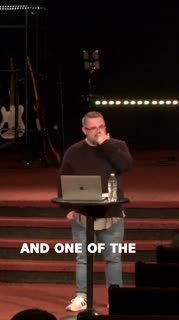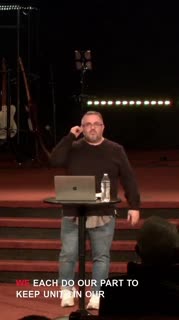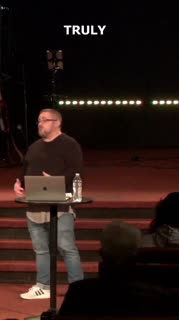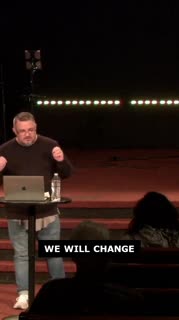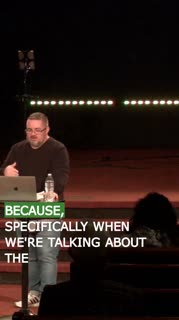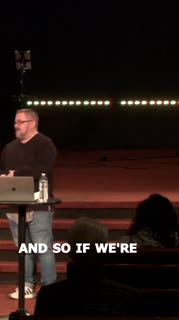Embracing Change: Unity and God's Transformative Presence
Devotional
Sermon Summary
Bible Study Guide
Sermon Clips
1) "And one of the things that I heard years ago was that I don't care how good your vision is. If your culture does not support the vision, culture wins every time. You can have the best vision since the invention of sliced bread. But if the culture does not support it, the vision will never take off and go anywhere. And so one of the things that I harp a lot on to our staff in leadership stuff is we talk about culture. Because culture is simply that important. And culture is really built. And culture is built up or built around our behaviors. The way that we act builds the culture that we have." [37:34] (59 seconds)
2) "We each do our part to keep unity in our speech, in our attitude, and in our actions. And what we wanted us to see was that number one is that God expects unity from us. This isn't a good idea, that God models and we just kind of look at and go, oh, if we could ever attain to that. No, no, no, no. He actually expects us to walk in unity, right? That is a God expectation placed on his people, okay? And we learn that actually that when we don't walk in unity, when we create this unity, we actually are setting ourselves up as an enemy of God because it's a God idea, not an our idea." [40:01] (47 seconds)
3) "We truly believe that God intended you to live life with other people, to live within the context of community. And when you do, you find support, you find care, you find accountability. Come on. Because nobody can call you on the carpet like your closest friends. Let a stranger come in and call you on the carpet. You do not. You do nothing but get offended. But you let someone that you know absolutely loves you and has your best interest at heart call you on the carpet. You might get offended, but you get over it because you know they love you." [46:51] (34 seconds)
4) "We will change the methods, never the message. Now, I'm going to need everybody in the room just to kind of sit back and take a deep breath because there are a lot of people out of us in this room that absolutely despise change. So everybody just take a breath with me. Breathe in. Breathe out. Right? I want to talk to everyone in the room for just a second because I want you to see that almost everyone in this room, whether we admit it or not, absolutely hates change." [47:50] (46 seconds)
5) "Because, specifically when we're talking about the church, when we embrace change, lives will be impacted. Now, I want to read, I want you to go with me to Acts chapter 2. Acts chapter 2. Acts chapter 2 should be, for those of you who come out of the, the Pentecostal Charismatic Movement, that, like, this should be a core scripture for you. For those who didn't come out of that movement, it should still be a core scripture. It's where the church was birthed. It was where the Holy Spirit was poured out. So I want you to, I want you to read it and I want you to look at it through the eyes of change for a moment because I think that can help us bring, some things into perspective." [59:58] (55 seconds)
6) "And here's what I've found, is everyone wants change in their lives except for when it comes to the church. We, I remember when we first moved to Durant, one of my first board meetings we sat into, and here's one thing that you learn quickly about church leadership is when you work as a board, the opinion of the board becomes your opinion when you walk out of the door, because you walk out in unity. We place all opinions on the table, but when a decision is made, we walk out in unity. So whether I would have chosen it or not, or they would have chosen it or not, that's irrelevant when we walk out of the door, because then we walk out and it was our decision. This is how we do it." [01:07:22] (56 seconds)
7) "And so if we're going to be committed to making an impact on the next generation, then we've got to increase our capacity for pain. We have to change the way we think about change. Not all change is negative. As I think I've proven to you over this last 30 minutes or so. But change can be difficult. And so I want you to understand even though it's a core value, we get it. I get that. But we as a body have made a commitment that we're going to reach every generation with the gospel. Change changing the methods. Never the message." [01:23:14] (56 seconds)
Ask a question about this sermon
2) "We each do our part to keep unity in our speech, in our attitude, and in our actions. And what we wanted us to see was that number one is that God expects unity from us. This isn't a good idea, that God models and we just kind of look at and go, oh, if we could ever attain to that. No, no, no, no. He actually expects us to walk in unity, right? That is a God expectation placed on his people, okay? And we learn that actually that when we don't walk in unity, when we create this unity, we actually are setting ourselves up as an enemy of God because it's a God idea, not an our idea." [40:01] (47 seconds)
3) "We truly believe that God intended you to live life with other people, to live within the context of community. And when you do, you find support, you find care, you find accountability. Come on. Because nobody can call you on the carpet like your closest friends. Let a stranger come in and call you on the carpet. You do not. You do nothing but get offended. But you let someone that you know absolutely loves you and has your best interest at heart call you on the carpet. You might get offended, but you get over it because you know they love you." [46:51] (34 seconds)
4) "We will change the methods, never the message. Now, I'm going to need everybody in the room just to kind of sit back and take a deep breath because there are a lot of people out of us in this room that absolutely despise change. So everybody just take a breath with me. Breathe in. Breathe out. Right? I want to talk to everyone in the room for just a second because I want you to see that almost everyone in this room, whether we admit it or not, absolutely hates change." [47:50] (46 seconds)
5) "Because, specifically when we're talking about the church, when we embrace change, lives will be impacted. Now, I want to read, I want you to go with me to Acts chapter 2. Acts chapter 2. Acts chapter 2 should be, for those of you who come out of the, the Pentecostal Charismatic Movement, that, like, this should be a core scripture for you. For those who didn't come out of that movement, it should still be a core scripture. It's where the church was birthed. It was where the Holy Spirit was poured out. So I want you to, I want you to read it and I want you to look at it through the eyes of change for a moment because I think that can help us bring, some things into perspective." [59:58] (55 seconds)
6) "And here's what I've found, is everyone wants change in their lives except for when it comes to the church. We, I remember when we first moved to Durant, one of my first board meetings we sat into, and here's one thing that you learn quickly about church leadership is when you work as a board, the opinion of the board becomes your opinion when you walk out of the door, because you walk out in unity. We place all opinions on the table, but when a decision is made, we walk out in unity. So whether I would have chosen it or not, or they would have chosen it or not, that's irrelevant when we walk out of the door, because then we walk out and it was our decision. This is how we do it." [01:07:22] (56 seconds)
7) "And so if we're going to be committed to making an impact on the next generation, then we've got to increase our capacity for pain. We have to change the way we think about change. Not all change is negative. As I think I've proven to you over this last 30 minutes or so. But change can be difficult. And so I want you to understand even though it's a core value, we get it. I get that. But we as a body have made a commitment that we're going to reach every generation with the gospel. Change changing the methods. Never the message." [01:23:14] (56 seconds)
